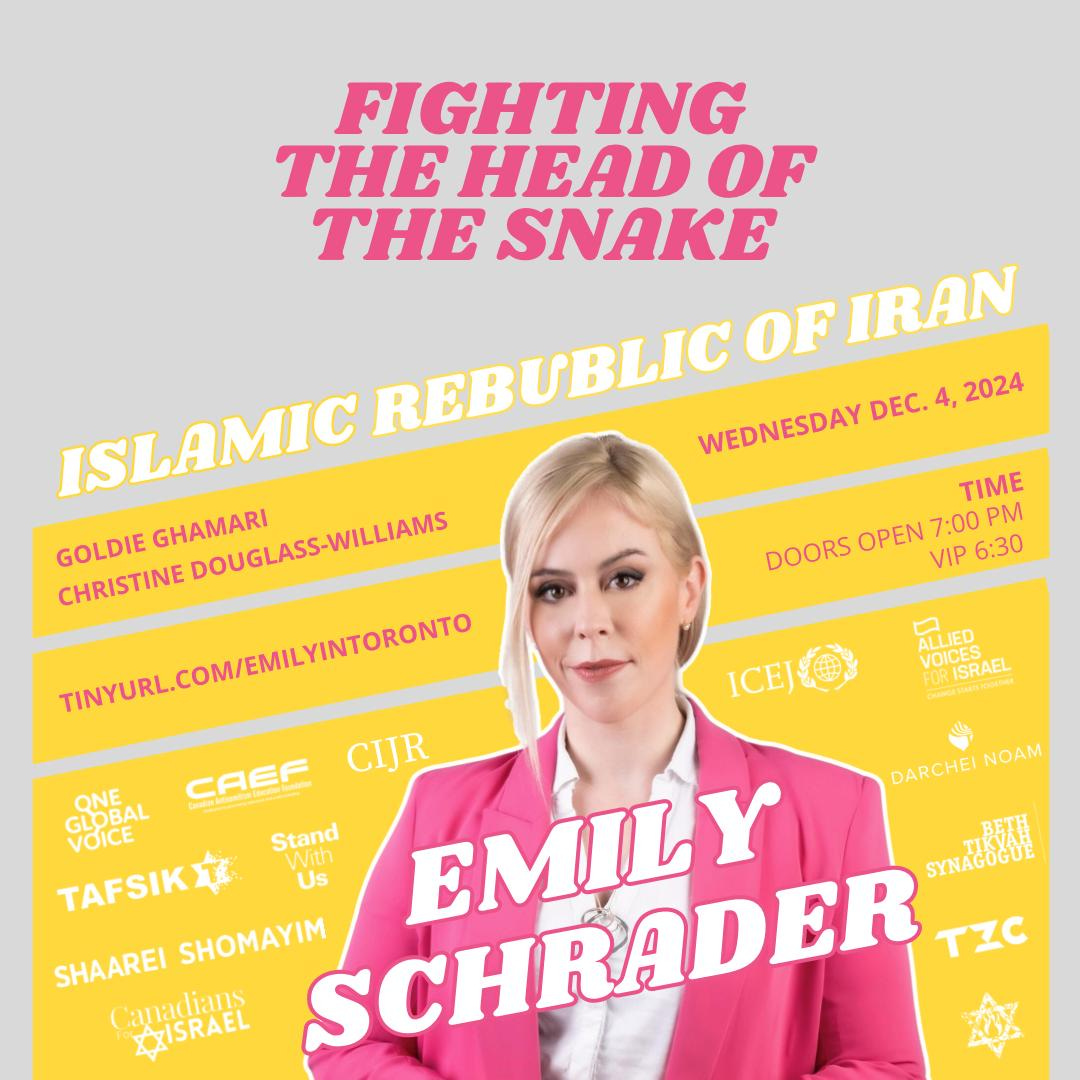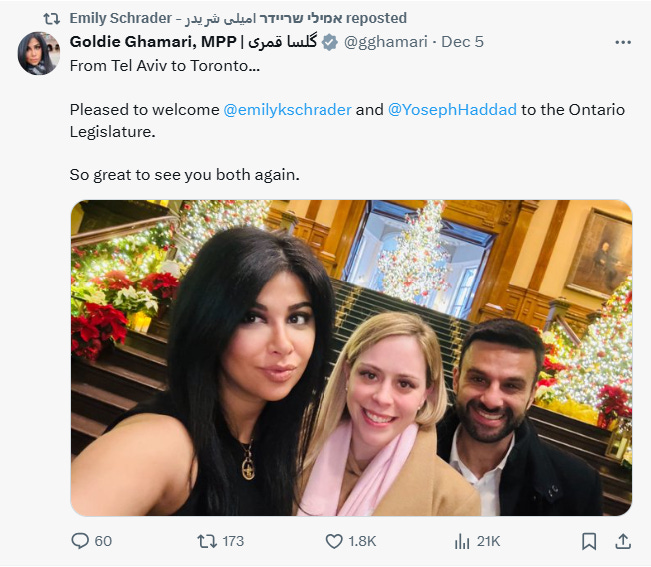Emily Schrader, American-Israeli journalist, headlined a panel in Toronto Dec. 4, with cofounder of Tag TV Haleema Sadia, Iranian born Ottawa-area MPP Goldie Ghamari, and journalist Christine Douglass-Williams, in a talk entitled The Head of the Snake, the Islamic Republic of Iran.
Schrader is an anchor on ILTV in Israel, co-hosts a panel show on Jewish News Syndicate, and is a contributor to YnetNews. She founded the Israeli Iranian Women's Alliance this year, which aims to bring Jewish and Iranian communities together to promote women's advancement and democratic values. Schrader has amassed a following of over 400,000 across various platforms, including 75,000 followers inside Iran. She was named one of the "100 People Positively Influencing Jewish Life" by Algemeiner in 2022 and one of the 18 "women to watch" by Hadassah Women's Zionist Organization in 2023.
In her opening remarks, she spoke of growing up “nominally pro-Israel” until her time at University of Southern California as an undergrad student. “I didn't realize how much people passionately hate Israel and Jews until I went to university,” she noted.
Her first time “really seeing this visceral, irrational obsession with the Jewish state, which really is an obsession with Jews,” was during Israel Apartheid Week, held by Students for Justice in Palestine. She said she was “irritated” by the “lies they spread across campus.” She joined Students for Israel in response to “this obsessive hatred towards Israel.”
“I always joke that Students for Justice in Palestine – the best thing they ever did was make me the biggest Zionist in the world. I would not be Israeli today if it was not for Students for Justice in Palestine. So I guess I have them to thank for that.”
The talk was organized by Canadian Antisemitism Education Foundation, OneGlobalVoice, Allied Voices for Israel, Tafsik, Toronto Zionist Council, and Canadians for Israel.
The Catch interview:
What's your overall take on the Hizbollah ceasefire?
I think it's pretty clear that this ceasefire was not going to last from day one. That being said, I supported it, because obviously this is a 60 day ceasefire. And it was done 54 days before President-elect Trump comes into office. That is not by chance, that absolutely is by design. That is what Israel needed. They've been struggling with pressure from the US administration under Biden for quite some time, on top of pressure from the international community. So I'm not surprised at all to see this ceasefire specifically with the terms that they gave. And the reason for that is because Israel also needed this time to allow our soldiers some time to rest and recover.
And also, of course, we wanted to prepare to deal with a new administration in the United States, and we wanted to allow some amount of time for the people of the North, in some cases, to return to their homes. I know this is one of the biggest criticisms of this, but this is never intended to be a long term ceasefire, and that was said, I think, on the day that they actually signed it.
This is not an end to the war. It's a temporary ceasefire for strategic reasons, and we're seeing that play out now, I'm not surprised at all to see that Hezbollah has had some violations, even within the first few hours. I think they had some of the Hezbollah terrorists returning to the areas where they're not supposed to return to, which is why you saw Israel respond in terms of the accusations from the international community about Israel allegedly violating or having 100 violations of the ceasefire.
I don't know every single example, because I have not yet looked through all of what they provided, but I will say that based on my previous experience and incidents like this, some of the things that the international community has accused Israel of doing in terms of violating agreements or violating ceasefires are things like, you know – and I'm not exaggerating when I say this – being asked to investigate why a goat that belongs to a Jewish person went into the territory of a Palestinian.
I mean, ridiculous things. And they're claiming that these are somehow violations of, you know, severe violations of the ceasefire. And that's simply not the case. There's definitely a bias against Israel. There has been throughout this war in the international media, and in the international community, above all, the United Nations has been absolutely obscene because it's been taken over by dictatorships.
China, the Chinese Communist Party, runs the United Nations by and large today. And we also see a lot of dictatorships on the Human Rights Council, even on the Security Council. You know Russia has veto power. So this is an ongoing problem in the international community, and something that hopefully also will be dealt with by a new a new administration in the United States. We'll have to see how that plays out as well.
But I'm not surprised at all to see these accusations. I want to add one more thing about the ceasefire. You can't have the Lebanese army enforcing the demilitarization of Hezbollah when Hezbollah is a part of the government. This is a way that they have used to get around UN resolution, 1701, and 1559, which required Hezbollah to be on the other side of the Litani River, something they've been violating for years that they've never been able to enforce. The UNIFIL, the UN body that's, you know, supposed to keep Hezbollah out of that area, or the Lebanese army, they've never been able to do that. We don't expect that they would now, despite the fact that the Lebanese army has been tasked with getting Hezbollah on the other side of the Litani, there wasn't much discussion about demilitarization of Hezbollah. They said that they would do it, but nobody really believes that. That's why, from the beginning, we knew that this wasn't a ceasefire
What ought to be done diplomatically and militarily in the foreseeable to deal with Iran?
I am tentatively, cautiously, pleased with the picks of President-elect Trump, and his administration, for dealing with these issues. But there are some questionable figures as well that I'm not so keen on, like Tulsi Gabbard (the next director of national intelligence) being one of them.
We'll have to see what, how, it plays out in the long term. It's not that I don't like her. I'm not sure that I really trust her, her approach to Assad in Syria and also Putin in Russia, she's been kind of defensive of them in the past. She flew all the way there (to Syria), which is why she received so much criticism on this issue. I'm just not sure about her, whereas some of the other candidates for different positions, I'm like, great, that's going to be great when it comes to dealing with the Islamic regime in Iran.
First of which would be Marco Rubio (Secretary of State), who always has been excellent on these issues, including dealing with the Islamic regime in Iran. But in terms of what will happen with Iran or what I think should happen, if you want to avoid an all out war, you're going to have to have countries de-recognizing this regime. And I know that it's a bit of a tall order, especially for Europe, because they're so embedded, also economically, but you're not going to see a different reality in the Middle East until this regime falls. The best way to do that without having a terrible, very, very bloody war is by enforcing sanctions, demanding, confiscating funds, that have already been invested in Europe. Demanding that there's zero tolerance for the proliferation of terrorist organizations and the funding for terror groups throughout the Middle East, the proxies, and also expelling ambassadors and telling them you are not a legitimate regime. We do not recognize you.
What we've seen is a lot of corruption and a lot of excuse making for the terrorist activities of the Islamic regime in Iran. And that goes for the nuclear program. It goes for its support for terrorism. It goes for human rights violations within Iran and we cannot tolerate this. It will continue to get worse if we don't deal with it, which is what we've seen in the last 45 years.
What is Iran's global impact and its strategies for extending its influence beyond the Middle East?
Terrorist organizations, they're also impacting the region already. They're impacting Latin American countries. They've infiltrated much of the West. The IRGC has plotted terror attacks. They've plotted kidnappings. They've carried out kidnappings and assassinations on foreign soil, and they've had zero accountability. And it will only get worse, because the only language that the Islamic regime in Iran understands is force. Now I don't necessarily mean military force, but force, and they need to be forced to behave. This is a rogue terrorist regime, that is as brutal; if not more brutal, to their own people than they are to everyone else in the rest of the world. And we cannot continue to ignore it and look the other way. This is not just Israel's problem. You can dismiss it as Israel's talking points, but it's going to come to you whether you agree with us or not, and that goes for Canada or the United States or Europe. Unfortunately, I wish I was wrong, but I'm not.
I also want to add one more thing that kind of shows that it's not just about Israel, right? I mentioned earlier today, when I was speaking to another interview, that it's not what we see on the ground, like these protests. It's not about Palestinians, no. It's not about Palestinian rights. It's not about Palestinian civilians or wanting to end the war. Has nothing to do with that. These protests, some of which have been revealed to be funded, at least in part, by the Islamic regime in Iran, on Western soil, on campuses in America.
So the demand of these protests, it isn't about Israel, or if it is, it's about destroying the State of Israel, not ending a war, not the well being of Palestinians. Because if it was about the well being of Palestinians or Arabs or Muslims, then you would see the streets filled with protesters right now about Syria, where there is an ongoing conflict that has actually nothing to do with Israel. But you don't see that. You didn't see that when Assad killed 4,400 Palestinians. Nobody cared about those Palestinians.
You don't see protest or outrage about these things. Only when it comes to Israel. This is a PR campaign of the Islamic regime in Iran that is using Palestinians as pawns. It is a pro-terror movement. It's not about supporting Palestinians, and that's what people need to understand. This isn't about Israel. It isn't even about Jews. It isn't about any of the things that they want you to think it's about. This is about support for terrorist organizations and an attempt to infiltrate and undermine western values and the West, the freedoms that we have in the West.
What are we in Canada not doing, that we should be doing?
I think the most important thing is that we need to see law enforcement crackdown, first and foremost on these anti-Israel protests, these pro-terror protests that we're seeing. There's a reason that we have seen multiple antisemitic assaults and attacks, and I'm not talking about, you know, graffiti. Although that's also happening, but violent assaults against Jewish communities all over the world, and what are the consequences for that? What are the consequences when someone is punched in New York City at an anti-Israel protest. What does the NYPD do? Sometimes they arrest, maybe they're there for three hours, and then they release, and it's similar scenes of what we've seen in Canada. There's zero accountability for these crimes that are being committed with a racist, hateful, pro-terror agenda, and that cannot stand. It will only get worse. You have to deter this form of hatred. You have to deter it, or it will only grow. And we see that happening. It's a year after October 7, and I would argue that it's worse.






